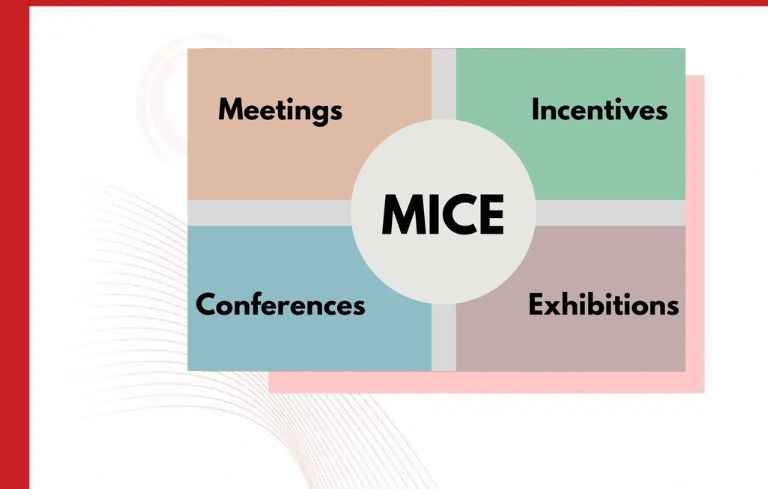
Role of MICE in Modern Corporate Events
In today’s fast-evolving business environment, corporate events are no longer limited to simple meetings or annual gatherings. Organizations n...
Tell us about your event, and hire4event will craft an experience you'll cherish forever. Start planning today!
Book Best Artist From Popular Cities
Book Best Artist For Overseas Locations
Book Top Event Venues in Popular Cities
Book Top Event Equipment for Rent in Popular Cities
Noida-based corporate event planning company offering expertly planned offsites, team-building activities, and travel solutions — seamless execution with Hire4Event.
Hire4Event: Trusted corporate event and conference organiser in Noida, Delhi, and Gurgaon, ensuring every event and conference is smooth and impactful for your business.
Complete event solutions — from booking top artists to securing premier venues and refining every production detail effortlessly. Endless possibilities with Hire4Event await.
Host your next conference with top event planners in Noida, Delhi, and Gurgaon — offering services nationwide and ensuring smooth execution no matter the city or scale.
Make your event unforgettable! Book top artists, live bands, DJs, comedians, and actors—all in one easy place.
Get everything you need for your event! From sound and lighting to staging and decor, we've got you covered.
Plan the perfect corporate offsite! We'll handle travel, stays, and team activities so you can focus on bonding.
Find the right venue hassle-free! Whether it's a wedding, corporate event, or launch, we'll help you book the best space.
Bring your team closer! Fun and engaging activities designed to boost morale, teamwork, and productivity effortlessly.
Host a flawless conference! Our expert planning ensures smooth execution, great engagement, and a stress-free experience.
Corporate Event Planner in Noida
Need a simple way to arrange your Corporate Event, Conference, Corporate Offsite, Annual Day, or Sports Event? Hire4Event, a one of the top and best event planning company in Noida, provides complete solutions customized for your various needs. With clear pricing and service across India, we ensure straightforward and worry-free event planning.
Trusted by Leading Companies

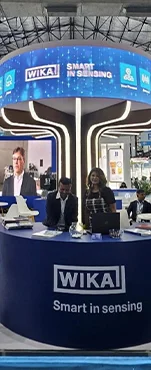

Hire4Event is a leading event management company that specializes in organizing conferences and corporate events. We operate in Delhi, Mumbai, Bangalore, Gurgaon, and Noida, ensuring seamless planning and execution for memorable and impactful experiences. Hire4Event is one of the top event management companies in Noida.
2790
2456




Hire4Event, a well-regarded event management company based in Noida, Delhi and Gurgaon, provides complete and bespoke event solutions throughout India. Our skills cover a diverse array of offerings, encompassing corporate event planning in Gurgaon, sizeable exhibitions, sports engagements, corporate retreats, and organized team-building activities. Furthermore, we have specialist knowledge in innovative experiential setups like augmented reality (AR), virtual reality (VR), and hybrid conference management in Noida, Delhi, Gurgaon and all other Major Cities of India. With a substantial inventory of professional audio-visual gear, our team guarantees every event is performed with accuracy, imagination, and technical mastery—specifically designed to achieve our clients strategic goals.
Entertainment for corporate event and wedding in Delhi, Noida, and Gurgaon
Make It HappenExhibition event organiser in Delhi, Greater Noida, and Gurgaon
Plan Your ShowcaseBest corporate sports event organiser in Delhi, Gurgaon and Noida
Plan Your Sports EventCorporate Dealer, Sales Meet, event organiser in Delhi, Noida and Gurgaon
Stage Your MeetBest Product launch event organiser in Delhi, Noida, Gurgaon
Shine Your BrandExplore our broad selection of event equipment and services, all carefully crafted to ensure your event runs smoothly, makes a big impression, and is truly memorable. This encompasses everything from audio-visual gear, interactive games, and advanced security systems, to stylish event tents, decor, and full event infrastructure. Our extensive services feature innovative tech assistance, imaginative design, branding Solution, custom event builds, engaging AR/VR experiences, and professional video conferencing setups. No matter if you're organizing a business gathering, trade show, wedding, or hybrid conference, we supply all the equipment—including smart lighting and superior sound systems— to easily turn your vision into reality. Find Your Equipment
We're the top corporate event and conference organiser in Noida, providing complete solutions for memorable and engaging experiences. We specialize in corporate events, conferences, dealer meets, annual celebrations, corporate offsites, team-building, R&R events, sports days, office outings, and entertainment. We also add innovation to your events with immersive AR and VR experiences. With a focus on creativity, perfect execution, and client satisfaction, we ensure each event is memorable and meets your business goals.
From event production to corporate conferences, weddings, and team-building activities, we deliver seamless experiences in Delhi, Noida, and Gurgaon.
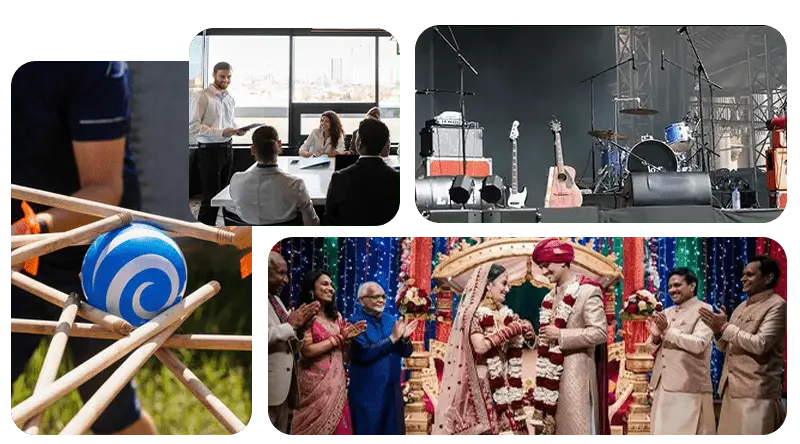
Event Production and Rental Service
Event Production Company in Delhi, Noida, and Gurgaon
Event ProductionTeam-Building Games for Corporate Events
Team-building Games, Activities organizer in Delhi, Noida, and Gurgaon
Team GamesWow! What an incredible event! From start to finish, everything was meticulously planned and executed flawlessly. The attention to detail and professionalism of the event management company truly shone through.
Thank you, Hire4Event, for making our corporate conference a success! Everything went smoothly, and the team exceeded our expectations. Will definitely use them again!
I have A fabulous experience with this company. They shared valuable tips and tricks for planning successful event under my budget and venue selection. I am very happy to share my experience on Google 👍🏻👍🏻
This company Team is very good to perform in corporate events and make solutions implemented, and the positive outcomes achieved for previous corporate events.
My experience is very good with hire4event. The hire4event team is very polite or professional and they helped me to the glimpses of event preparations, like venue selection, decor setup, and entertainment arrangements.
Best event management company. Our corporate event was a hit, thanks to Hire4Event. Excellent planning, coordination, and flawless execution. Highly recommend!
Thank you to the team for making our event memorable. I enjoyed it a lot. Looking forward to the next event soon!
On time setup completion. Quick response from staff. My event fantabulous. 👍🏽👍🏽 Services recommended ✅
Hire4Event specializes in corporate event planning, conference organizing, corporate offsite tours, event management, artist booking, and event production, offering comprehensive solutions tailored to meet diverse client needs.
Hire4Event organizes a variety of activities, including corporate team-building exercises, cultural events, entertainment shows, adventure activities for offsite tours, live music and artist performances, interactive gaming zones, photo booths, VR gaming experiences, and more tailored to event themes.
You can contact us via our website, phone, or email. See Hire4Event for details.
Yes, we handle events of all sizes, from intimate gatherings to large-scale productions.

In today’s fast-evolving business environment, corporate events are no longer limited to simple meetings or annual gatherings. Organizations n...
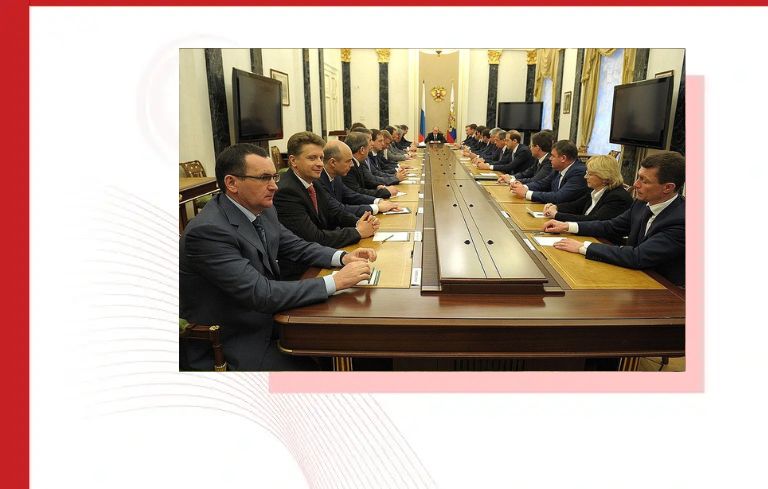
Today’s competitive corporate environment has transformed meetings from routine gatherings into strategic platforms for decision-making, colla...
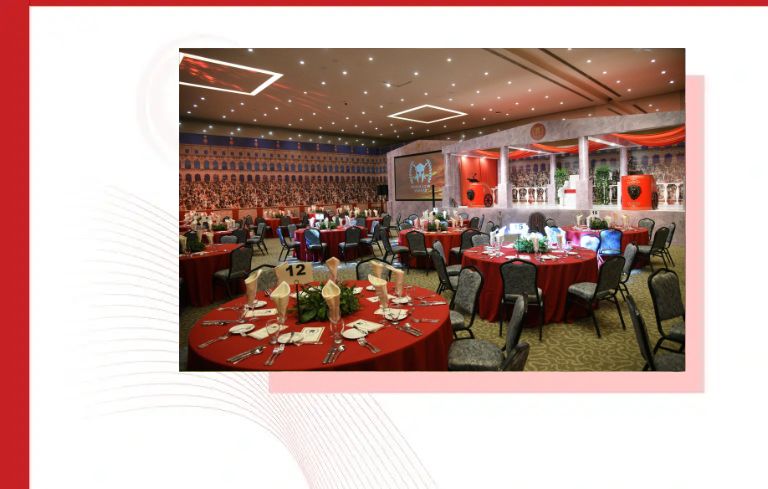
In today’s competitive business environment, corporate events are no longer limited to routine meetings or formal gatherings. They have become...